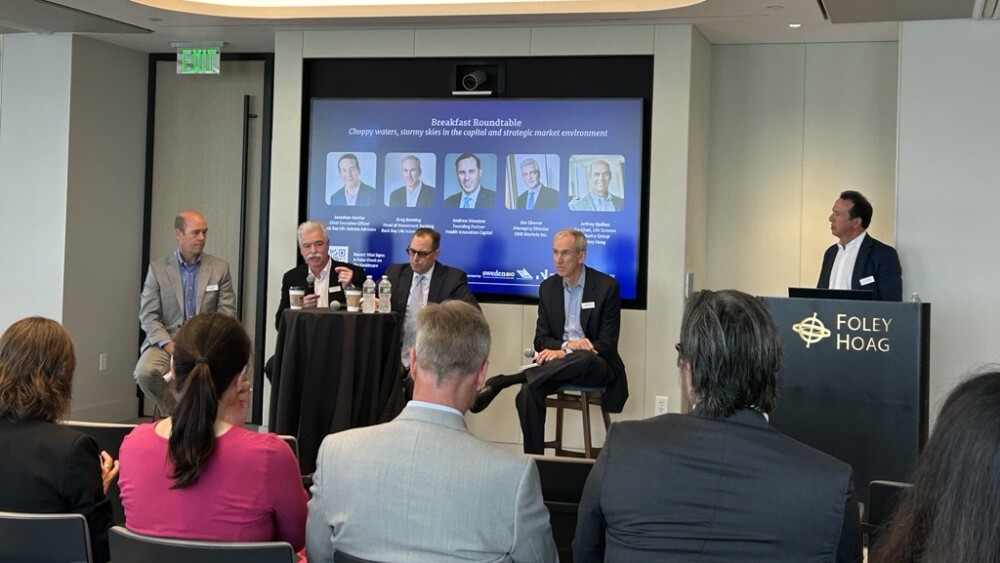WASHINGTON, Nov. 12 /PRNewswire/ -- Bolstering public understanding of and confidence in clinical research was the topic of discussion by three panels of distinguished experts during a recent forum sponsored by the Association of Clinical Research Organizations (ACRO). A Webcast of the forum will be available online free of charge on November 12 via the ACRO Web site, http://www.acrohealth.org/. The Webcast offers a maximum of 3.0 category 1 continuing medical education (CME) credits toward the American Medical Association Physician's Recognition Award.
The Webcast, titled Clinical Research Participation: Today's Challenges, Tomorrow's Possibilities, elicits the perspectives of key stakeholders on the process of clinical research to collectively examine key issues and potential action items to help educate the public on clinical trials. Ken Getz, president and chief executive officer of CenterWatch and author of Informed Consent, serves as moderator for the panel discussions. The first panel, comprised of patient advocates and clinical trial participants, provides a discussion of issues and perceptions from the clinical trial participants' perspective. The dialogue of this first panel, as well as recent studies conducted on public perception, set the stage for the second panel discussion from a legislative perspective, which includes representatives from Capitol Hill, patients, academia, bioethics, CROs, pharmaceutical companies, institutional review boards (IRBs) and clinical investigative sites. Finally, the third panel explores the perceptions and issues from a regulatory perspective, with panel members representing the Food and Drug Administration (FDA) and IRBs, as well as patients, academia, CROs, pharmaceutical companies and investigative sites.
"We are pleased to have been able to convene such a distinguished group of thought leaders for this important dialogue regarding ways to educate the public on clinical research," said Doug Peddicord, legislative director of ACRO. "ACRO members are committed to maintaining the highest standards in quality and patient education and believe all the stakeholders participating in this forum play an active role toward meeting the current challenges of clinical research participation."
The panelists presented a number of insights and ideas that converge and, with collective implementation of education-based initiatives, could assist in guiding public understanding of clinical research, Getz said in summarizing the forum. It was also noted that the educational approach may vary depending on whether the disease or disorder is life-threatening, impacting only quality of life, or chronic vs. episodic. Other key points that emerged from the discussions, according to Getz, include:
* determining the appropriate time and methods to provide education to benefit people who need to make critical decisions; * the importance of coordinating the momentum behind many industry, government and regulatory initiatives and reforms that have taken shape over the past several years; * the need for legislation that is targeted and flexible, but does not -- as one panelist described -- pull up the roots of a system that in many respects has worked fairly well; * the importance of engaging the media as an important partner in communicating educational messages to the public; and * the importance of recognizing that we are in the early stages of realizing the impact of recent regulatory and self-regulatory initiatives. The distinguished panelists include: * Richard Ascroft, RPh, JD, manager, federal affairs, public policy planning & development, Eli Lilly & Company; lead on task force that developed PhRMA's Principles on the Conduct of Clinical Trials and Communication of Clinical Trial Results * Art Caplan, PhD, chair, department of medical ethics and director, Center for Bioethics, University of Pennsylvania * Amy DelaCourt, MBA, current Crohn's clinical trial participant; vice president, Key Partners * Thomas N. Denny, MSc, health policy fellow, office of Sen. Judd Gregg * Alan F. Eisenberg, MPP, MSF, health and economics policy advisor, office of Rep. James Greenwood * Fred Eshelman, PharmD, chairman, ACRO board of directors, CEO, PPD * Felix A. Khin-Maung-Gyi, PharmD, MBA, CEO, Chesapeake Research Review, Inc.; member, Secretary's Advisory Committee on Human Research Protections (SACHRP) * Greg Koski, MD, PhD, senior scientist, Institute for Health Policy, Mass General Hospital; former director, Office for Human Research Protections (OHRP) * Amy S. Langer, MBA, executive director, National Alliance of Breast Cancer Organizations (NABCO) * Craig Lustig, MPA, pediatric cancer trial participant; vice president, survivorship program, The Children's Cause * Christine Pierre, RN, president, RxTrials Inc. * Jane Reese-Coulbourne, MSChE, cancer clinical trial participant; member and former executive vice president, National Breast Cancer Coalition (NBCC) * Joanne Rhoads, MD, MPH, director, Division of Scientific Investigations, CDER, FDA * Susan L. Weiner, PhD, president, The Children's Cause; member, SACHRP To register and receive a link to the Webcast, visit http://www.acrohealth.org/.
The Association of Clinical Research Organizations (ACRO) fosters continued advancement of medical product development. Member companies, representing a multibillion dollar global industry, provide a wide range of research and development services that help pharmaceutical and biotechnology companies bring medicines to patients quickly and safely. For more information about ACRO, visit http://www.acrohealth.org/.
Association of Clinical Research OrganizationsCONTACT: Doug Peddicord, Legislative Director of Association of ClinicalResearch Organizations, +1-202-543-4018, or healthadvocate2@worldnet.att.net
Web site: http://www.acrohealth.org/




